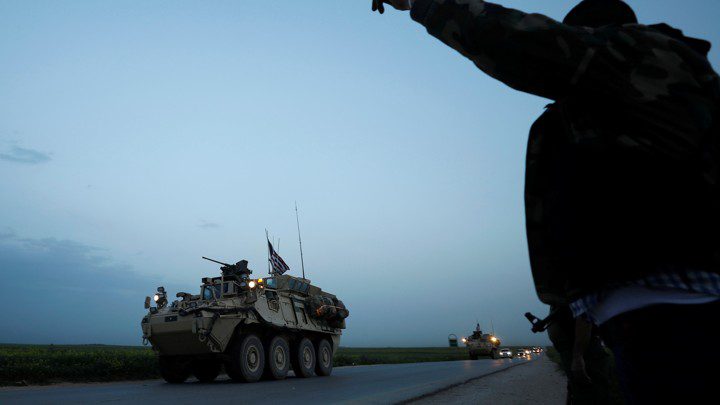Sign in
Yet, the Trump administration (and Obama’s before him) keep contending, as recently as March 8, that the PYD-YPG and PKK are separate entities. But this has no basis in observable fact. And given the organic links between the YPG and the PKK, the PYD-YPG autonomous zone in northeastern Syria will likely provide strategic depth for the PKK’s ongoing and future fight against Turkey—something Erdogan knows and fears. There are reports out of Turkey already that Kurdish militants aligned with the PKK and PYD organized and trained in YPG-held northeastern Syria for attacks conducted in Istanbul, Ankara, and Bursa, in 2016.
By relying on the YPG in the fight against ISIS, the United States is helping one terror group fight against another. That’s despite its longstanding policy of not working with any organization on the FTO, as it is doing with the YPG, which is effectively synonymous with the PKK. Of course, some argue that the PKK should not be on the U.S. FTO list. An in-depth discussion on the conditions for the PKK’s removal would require months. In the meantime, however, blatantly ignoring the FTO strictures on official U.S. conduct with a listed organization like the PKK and its subsidiaries reflects utter policy incoherence, diminishing America’s credibility on fighting terrorism.
America’s infatuation with the PYD-YPG also allows it to ignore some uncomfortable realities that will haunt it long after ISIS is ousted from Raqqa. While the PYD-YPG organization is secular, it is not democratic. It has repressed political competitors, detained other Kurdish political activists, and detained and harassed independent journalists. What’s more, its emphasis on gender equality, and its insistence on imposing its political agenda, will cause problems for the future governance of Raqqa, the de facto capital of ISIS, and other Arab-majority towns the United States is now helping it seize from a weakened ISIS.
But Raqqa, more than Damascus, Homs, or Aleppo, is known among Syrians as a conservative Arab city, where many communities retain links to tribal networks extending along the Euphrates and eastwards into the Syrian desert towards Iraq. Traditional norms, including those governing the roles of women, prevail. Many Americans find the constraints placed on Arab women objectionable, and would applaud Ms. Mohammed’s activism. But as the Iraq war should have taught Washington, it cannot impose, either directly or through local proxies, its own social and political norms on conservative Middle Eastern communities without potentially provoking a counter-reaction.
Arab opinions polls from recent years make this tension plain. An unofficial survey of ISIS fighters from 2014 conducted by a Lebanese communications firm showed that defending Sunni communities under attack was the top reason recruits from other Muslim countries joined ISIS. The 2016 ASDA’A Burson-Marsteller Arab Youth Survey highlighted how disputes over how best to interpret Islam and perceptions that western culture is being imposed on Arab societies feeds extremist recruitment. The longstanding Arab-Kurdish ethnic competition and the PYD’s ideological agenda, such as suddenly imposing gender equality, stand to boost extremist recruitment once ISIS shifts to insurgency mode after the fall of Raqqa.
Most worrisome: evidence that Sunni-Arab extremists learn and adapt from their own mistakes. In Idlib province in northwest Syria, al-Qaeda shifted away from the brutal tactics it honed in Iraq from 2004 to 2009. Instead, by transitioning into something of an “al-Qaeda, Version 3.0,” it has reduced violence against local populations, provided infrastructure-service delivery through local administrators, and integrated more with local communities. If the Arab communities of eastern Syria perceive that the PYD-YPG seeks to dominate them, wiser al-Qaeda and ISIS leaders in Syria may be poised to pick up more recruits and embed in communities, making the coming Arab insurgency harder to contain.
For now, ISIS is still in Raqqa and hasn’t yet shifted into wide-scale insurgency mode. But it won’t be long until Washington will have to decide who will control and govern Raqqa and eastern Syria, and who will pay for it. As Colin Powell told George W. Bush in 2003, if Bush toppled Saddam, America would “own” Iraq and have to take responsibility for it. America may soon have 1,000 more troops on the ground in eastern Syria, and its proxies are seizing new territory from ISIS every week with U.S. support, including a Marine artillery battalion and regular airstrikes. There are even U.S. peacekeepers deployed in Manbij and near Tel Abayad to keep Turkish, Syrian-Arab, and Syrian-Kurdish fighters from shooting at each other. America now effectively owns eastern Syria.
We want to hear what you think about this article. Submit a letter to the editor or write to [email protected]


Leave a Reply